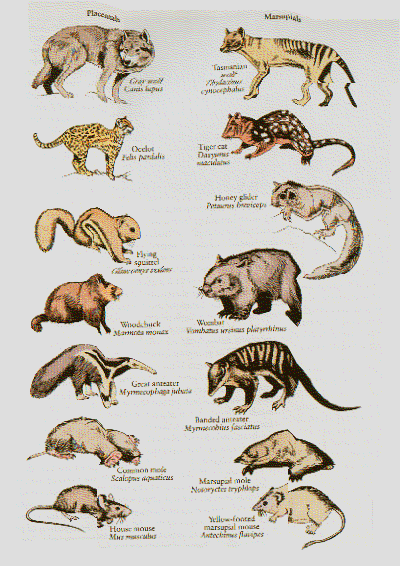225 million years ago when the super-continent Pangea existed (Earth was a big clump of land together). When Pangea broke apart millions of years ago the land became continents. When Pangea existed the first mammals evolved on Pangea. The mammals were all in Australia as we know today. When Pangea sperated from Australia it has A lot of ancestors of marsupials. (Marsupials are animals that bear their young in an external pouch, like kangaroos). The last animal left on land developed into placentals which means that they have an embryonic sac in their mother's uterus.
The Difference Between Marsupials And Placentals
- The rate in gestation
- The length of time the offspring is the uterus
Placentals
- Placentals develop a more complex, longer lasting placenta that transfers between the young and the mother
- Birth longer
- The placenta has different layers with blood vessels
- Pouched animals
- the embryo that is developing is isolated from its mother's body by the amniotic membrane
- The growth in the uterus is limited to quantity of nutrients
- Birth earlier
- May spend at least 12 days in the reproductive system
The Theory of Marsupials Origin
It appears that marsupials and placentals are relatively twins. As theorist try and find an explanation to why this is they start to look at the difference and similarities in the marsupials and placentals animals. Their trying to see if marsupials was the evolve of placentals. Their trying to see if when Pangea broke apart that placentals evolved from marsupials and the existence of marsupials explain the evolution of placentals.
Evolution Of The Distribution of Mammals
The distribution of mammals are categorized by their genetic that they have inherited. They also depend on the area of the environment they are in and if they are able to survive in the environment they are in. They are separated by geographically.
"Ex: Marsupials are found exclusively in Australia, whereas placentals are very rare in Australia."
| Common Names | Scientific Name | No. Genera | No. Species | Distribution |
| Oppossums | Didelphidae | 12 | 70 | Americas |
| Marsupial Mice, Marsupial Cats, Tasmanian Devil | Dasyuridae | 14 | 50 | Australasia |
| Tasmanian Wolf | Thylacinidae | 1 | 1 | Tasmania |
| Numbats/Banded Anteaters | Myrmecobiidae | 1 | 1 | Australia |
| Bandicoots | Peramelidae | 8 | 18 | Australasia |
| Shrew Oppossums | Caenolestidae | 3 | 7 | South America |
| Possums, Cuscuses, Gledero, Ringtails | Phalangeridae | 13 | 40 | Australasia |
| Noolkanger or Honey Possum | Tarsipedidae | 1 | 1 | Australia |
| Koalas | Phoscolaratidae | 1 | 1 | Australia |
| Wombats | Vombatidae | 2 | 4 | Australia |
| Kangaroo/Wallabies, Potoroos, Rat Kangaroos | Macrophodidae | 15 | 47 | Australasia |


No comments:
Post a Comment